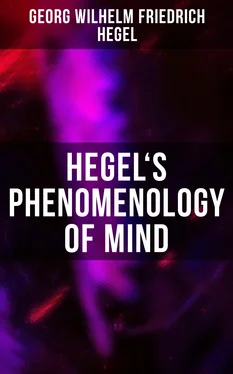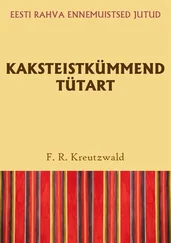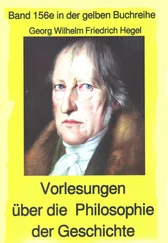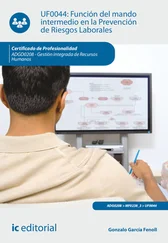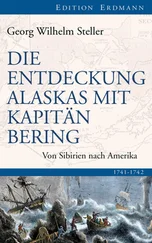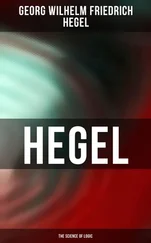3.Cp. Wissenschaft der Logik , Buch 2, Absch. 2, Kap. 1. Das Ding und seine Eigenschaften, etc.
4.This expression refers to the distinction already made in the Introduction, between the point of view of the Phenomenology and that of the actual consciousness whose procedure is being analysed in the Phenomenology . That is “for us” which we (i.e. the philosophical “we”) are aware of by way of anticipation, but which has not yet been evolved objectively and explicitly; it is intelligible, but not yet intellectually realized. That is “in itself” ( an sich ), which is implicit, inherent, or potential, and hence not yet explicitly developed. The terms “for us” and “in itself” are thus strictly alternative: the former looks at the matter from the point of view of the philosophical subject, the latter from the point of view of the object discussed by the philosopher. The implicit nature of the object can only be “for us” who are thinking about the object: and what we have in mind can only be implicitly true of the object. The alternative disappears when the explicit nature of the object is what “we” explicitly take the object to be.
5.An expression drawn from the physics of Hegel’s day.
III. Force and the Understanding-The World of
Appearance and the Supersensible World 6
Table of Contents
[The term “force” holds primarily with reference to the realm of Nature, whether physical or vital: but it is also used, more or less analogically, in reference to other spheres, e.g. morality. It is the objective counterpart of the activity of “understanding”; it is objectively the same kind of relation of unity to differences which is subjectively realized when the mind understands. Force is a self-conditioned principle of unity; the differences are the “expressions of force”, the unity evolves the differences out of itself. Understanding similarly is a self-conditioned process; it consists in reducing differences to some ultimate unity, which is capable of deriving or “explaining” those differences from itself. The “unconditioned universal” to which we are led by the analysis of perception takes shape, therefore, as “force”. The question is, How are the elements of this unconditioned universal related, and how do they hold together? The answer is found in the highest achievement of the operation of understanding-the establishment of a “kingdom of laws”, which in its entirety is the meaning of the world so far as understanding goes. But laws per se are looked on as an inner realm, which merely “appears” in the detailed particulars which those laws control, and in which those laws are made manifest. The differences, in fact, are “phenomena”, the laws per se are behind the scenes:— the world as a whole thus becomes distinguished into a realm of phenomena and a realm of noumena. These two realms set a new problem to the mind, and must again be brought together in a completer way than understanding can do. This new state of consciousness is “self-consciousness”.
In this section we have at once an analysis of empiricism and a Criticism of the Kantian solution of the problem of empiricism. It is shown that if phenomena are appearances of noumena, then the noumena do appear, and are, in fact, nothing except so far as they appear: otherwise the noumena, so far being “hidden”, are worse than appearances, they are illusion. The phenomena are not merely appearances “to the mind”, but appearances of something that does make itself manifest. If phenomena are thus not external to and still less independent of noumena, noumena are just as truly immanent in phenomena. Treated in any other way, noumena can at best be only another kind of phenomena; and this raises anew precisely the problem which the opposition of phenomena or noumena was intended to solve. Phenomena are related to noumena as the trees to the wood, not as a compound to its atoms. The solution of the difficulty is thus only to be found in the type of consciousness which contains both — and this, Hegel says, is self-consciousness.]
Consciousness has found “seeing” and “hearing”, etc., pass away in the dialectic process of sense-experience, and has, at the stage of perception, arrived at thoughts which, however, it brings together in the first instance in the unconditioned universal. This unconditioned element, again, if it were taken as inert essence bare and simple, would itself be nothing else than the one-sided extreme of self-existence ( Fürsichseyn );for the non-essential would then stand over against it. But if thus related to the latter, it would be itself unessential, and consciousness would not have got disentangled from the deceptions of perception; whereas this universal has proved to be one which has passed out of such conditioned separate existence and returned into itself.
This unconditioned universal, which henceforward is the true object of consciousness, is still object of consciousness; consciousness has not yet grasped its principle, or notion, qua notion. There is an essential distinction between the two which must be drawn. On the one hand, consciousness is aware that the object has passed from its relation to an other back into itself, and thereby become inherently and implicitly ( an sich ) notion; but, on the other hand, consciousness is not yet the notion explicitly or for itself, and consequently it does not know itself in that reflected object. We (who are analysing experience) found this object arise through the process of consciousness in such a way that consciousness is implicated and involved in the development of the object, and the reflection is the same on both sides, i.e. there is only one reflection. But because in this movement consciousness had as its content merely the objective entity, and not consciousness as such, the result has to be given an objective significance for consciousness; consciousness, however, still withdrawing from what has arisen, so that the latter in objective form is the essential reality to consciousness.
Understanding has, indeed, eo ipso, done away with its own untruth and the untruth in its object. What has thereby come to view is the notion of the truth as implicit inherent truth, which is not yet notion, or lacks a consciously explicit existence for itself ( Fürsichseyn ), and is something which understanding allows to have its way without knowing itself in it. It pursues its own nature by itself, so that consciousness has no share in its process of free realization, but merely looks on and apprehends that realization as a naked fact. It is, consequently, our business in the first instance to step into its place and be the notion, which works up into shape what is contained in the result. With this complete formation of the object, which is presented to consciousness as a bare existent fact ( ein Seyendes ), mere implicit awareness then first becomes to itself conceptual consciousness, conscious comprehension.
The result arrived at was the unconditioned universal, in the first instance in the negative and abstract sense that consciousness negated its one-sided notions and abstracted them: it surrendered them. This result, however, has inherently a positive significance; it has established the unity of existence-for-self, and existence-for-another; in other words, absolute opposites are immediately posited as one and the same reality. At first this seems to affect merely the formal relation of the moments to one another. But to be for-self and to be for-another constitutes the content itself as well, because the opposition, looked at truly, can have no other nature than what has come about in the result — viz. that the content, taken in perception for truth, belongs, in point of fact, solely to the form, and is dissipated into its unity. This content is at the same time universal; there can be no other content which by its peculiar constitution would refuse to return into this unconditioned universality. Such a content would be some specific way or other of being for-itself and taking up a relation to something else. But to be in general for-self and to stand in relation to something else constitutes the very nature and meaning of that whose truth lies in being unconditionally universal; and the result is through and through universal.
Читать дальше
